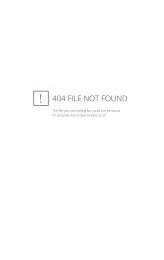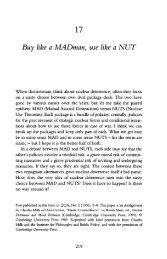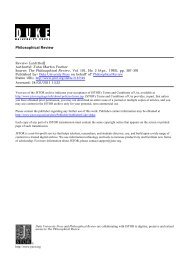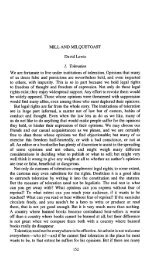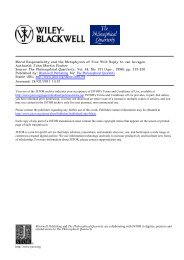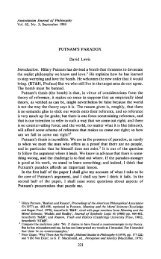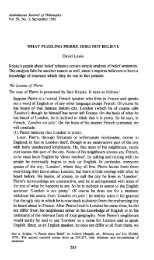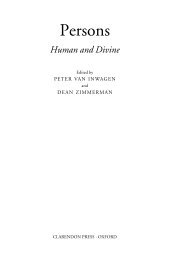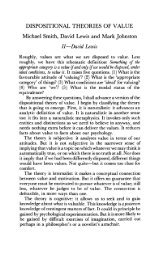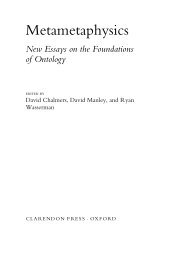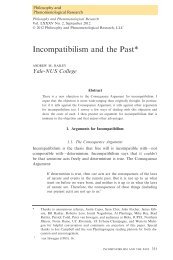Tooley and Evil - Andrew M. Bailey
Tooley and Evil - Andrew M. Bailey
Tooley and Evil - Andrew M. Bailey
- No tags were found...
Create successful ePaper yourself
Turn your PDF publications into a flip-book with our unique Google optimized e-Paper software.
70<strong>Tooley</strong> <strong>and</strong> <strong>Evil</strong>: A ReplyDownloaded by [University of Notre Dame] at 11:51 14 April 2012or(8)If Curley had been offered a bribe of $20,000 he would not haveaccepted the bribe 4is true. Furthermore, he says, this assumption is 'implausible'. Now I don'tthink this assumption is at all implausible. But the important point here -- apoint that seems to have eluded <strong>Tooley</strong>'s attention -- is that the free willdefense, as I stated it, is in no way dependent upon the assumption that either(7) or (8) is true. I gave two versions of the crucial argument m the argumentfor the conclusion that there are possible worlds God could not have weaklyactualised; one of these arguments took as a premiss the disjunction of (7) <strong>and</strong>(8) <strong>and</strong> the other did not. Before giving the first argument, I saidAccordingly, I shall temporarily take it for granted, in what follows, thateither (7) or (8) is true; as we shall see .... this assumption, harmless as it nodoubt is,, can be dispensed with. (p. 180)After giving the argument I said once more that this assumption is dispensible<strong>and</strong> then gave for the same conclusion another argument that dispensed with it.Where is the lack of rigour there?Indeed, so far as rigorlessness goes in this context, the shoe is on the otherfoot. According to <strong>Tooley</strong>,Another reason why it is very difficult to see why one should think theanswer to the question whether the disjunction of (7) <strong>and</strong> (8) is true isaffirmative, let alone obvious, is that neither a consequence analysis ofsubjunctive conditionals nor a possible worlds analysis of the Lewis varietyentails that either (7)is true or (8) is true. A Stalnaker account does havethis consequence, but it does so because it collapses 'would' conditionals <strong>and</strong>'naight' conditionals <strong>and</strong> is implausible for precisely that reason. (p. 364)Wlaat <strong>Tooley</strong> seems to mean here is that the formula(10) A---*B v A---*B,which is the form of the disjunction of (7) with (8), is valid on Stalnaker'ssemantics for subjunctive conditionals but not on Lewis'. Now suppose weassume for purposes of argument that Lewis' semantics is in fact adequate. Howdoes the fact that (10) is not valid on it constitute a reason for thinking that thedisjunction of (7) with (8) is not true? Perhaps some propositions of the formof (10) are false while others of that form are true or even necessarily true; <strong>and</strong>perhaps counterfactuals of the sort under consideration fall into the latter class.None of the logics proposed for possibility <strong>and</strong> necessity yield necessarily7+ 5= 12 as a consequence (either syntactically or semantically); is that a reasonfor supposing that proposition false?In his concluding summary <strong>Tooley</strong> makes a vastly stronger claim:Thus, for example, he [Plantinga] advances a claim about subjunctiveconditionals, for which he offers no support at all, despite the fact that the4 The numbering here is from NN p. 174.



